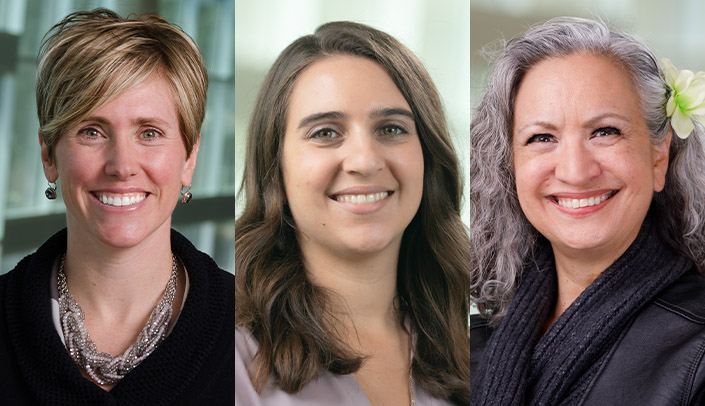In celebration of Women in Medicine Month, UNMC hosted a panel discussion that touched on the national Invest in Her campaign and the challenges of recruiting, retaining and promoting women at an academic health center.
The panel was moderated by Sheritta Strong, MD, assistant vice chancellor of inclusion, who acknowledged that the Invest in Her campaign is geared toward women physicians but said all women at UNMC face similar challenges whether in direct patient care or behind the scenes.
The pandemic has exacerbated the challenges women face, said Chancellor Jeffrey P. Gold, MD, but also has increased opportunities to strengthen and focus on issues from childcare, wellbeing and equity to eldercare, promotion and tenure. “Bringing together inspired communities of leaders is what it will take to get this work done,” he said.
View a recording of the event.
The Invest in Her campaign highlights the need to value women in medicine and is important as the industry reaches a point of critical need. By video, Julie Silver, MD, an equity researcher and physical medicine and rehabilitation physician at Harvard Medical School, challenged the group to find ways to retain current faculty and staff saying: “We are underinvesting in the people we already have at our institutions. Those are the people we need to support right now.”
UNMC psychiatry chair Howard Liu, MD, discussed the importance of allyship, amplifying women’s voices through different platforms and the need for “persistent and consistent championship of women” to create more inclusive environments.
Psychologist Brandy Clarke, PhD, director of the UNMC Office of Equity, agreed, noting: “We’re reaching a tipping point of critical need. These are not new issues or a new topic. For many years, we’ve done a good job in growth and increasing numbers of women in the field, but that hasn’t always been equitable in all the areas it needs to be. … We’re at that place where we might lose out if we don’t do some real things now.”
Historically, second-shift work (such responsibilities as childcare and eldercare) have fallen on women, said Ali DeLizza, PhD, child psychologist and co-chair of the DEI committee in psychiatry. The pandemic further exacerbated these issues, she said, which left less time for women in the workforce to focus on professional activities that move them into leadership roles.
UNMC is actively targeting the inclusion of women in several ways, including: active listening, the sharing of resources and recognizing the diverse roles held by women in academic medicine.
“As much as we want to have a culture that celebrates an interprofessional team, we also need to support a culture that really drives at having honest, direct communication,” said Sarah Gloden Carlson, JD, director for UNMC Human Resources, interim assistant vice chancellor and chief compliance officer. “We need to focus on our ITEACH values.”
This means providing support and resources when it comes to additional requirements for leadership roles and promotions, according to the panel — and, said Quan Ly, MD, surgical oncologist, not penalizing women for being assertive when they are advocating for themselves and their patients.
“We all hold such diverse roles that our standards need to be sensitive to that and acknowledge and equally weigh those different roles,” Dr. DeLizza said.
Recognition is as important as equitable pay, said Siobhan Wescott, MD, director of the American Indian Health Program at UNMC, noting: “Just thanking your employees, your staff, your peers, your bosses, goes a long way … to keep women feeling that they are appreciated, and their time at work is important.”
The UNMC Offices of Inclusion & Equity, Department of Psychiatry and WE STRIVE co-sponsored the panel discussion.
For upcoming events, sponsored by the Offices of Inclusion and Equity or WE STRIVE, go to UNMC’s Engage or UNMC Today’s calendar pages.
